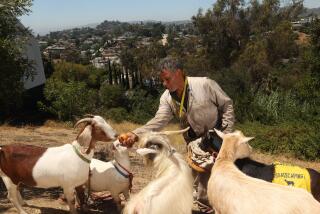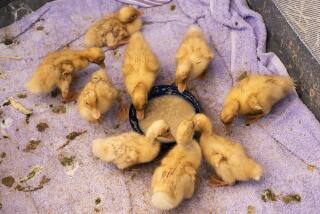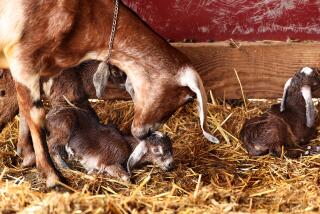Activists Take Ducks From Foie Gras Shed
- Share via
FARMINGTON, Calif. — With only the dim light of a half-moon to guide them, four self-proclaimed “duck freedom fighters” made their way early Wednesday across an abandoned field, around dilapidated, foul-smelling chicken pens, and over a narrow passage through a large manure-filled pond.
After a difficult 1 1/2-mile hike, Bryan Pease, Kath Rodgers, Carla Brauer and a man who refused to identify himself reached the Sonoma Foie Gras duck shed. Soon, four Peking-Muscovy ducks were free.
The group had been eyeing the site for weeks in preparation for this mission, which they hoped would save the lives of a few ducks that were scheduled to be killed to produce foie gras, an expensive culinary delicacy often sold at high-end restaurants.
The participants said the cause is important enough to justify their actions. But Sonoma Foie Gras owner Guillermo Gonzalez, when reached later about the incident, said he was outraged by people trespassing on his property and taking his animals. Although he had not yet noticed the four ducks missing, Gonzalez said charges should be brought if the birds were stolen.
“Unfortunately, some activists hold animals in higher esteem than they do humans,” said Gonzalez. “Our animals are treated humanely, and anybody who enters our farm can see that.”
To the four activists, animal cruelty is intrinsic to the production of foie gras, which requires ducks to be pneumatically force-fed large amounts of a corn-based meal in order to enlarge their livers. The controversial feeding practice takes place twice a day over the four-week period before a duck is slaughtered.
The group had conducted such operations previously as part of what it calls “the underground railroad for ducks.” But this one was a bit more complicated.
The night before, a Bay Area television station had aired portions of a video the four, members of an ad-hoc animal rights group that calls itself the Animal Protection and Rescue League, had shot earlier this year showing conditions at the farm.
“This may not be as easy tonight,” said Pease, a veteran of several duck releases, as he crossed through a field in the still night. “After the video, there may be someone there waiting for us.”
The video had been released by Gourmet Cruelty, an animal rights group that has launched efforts to ban foie gras production in California. Its graphic footage detailed the living conditions of ducks at Sonoma Foie Gras, one of only two producers of the delicacy in the U.S. and the only one in California.
Sonoma Foie Gras leases sheds and some land here, near Stockton.
Pease, like the others, was wearing disinfected clothes, rubber boots, and surgical masks and gloves in order to prevent the spread of Exotic Newcastle Disease, which has recently killed millions of poultry animals in California.
When he realized that his bolt cutters would not do the job on new locks that had been installed at the shed, he quietly tiptoed around the building, just a few yards from the homes of sleeping Sonoma Foie Gras employees, and found an alternative entry: an unsophisticated air-conditioning system made of porous, accordion-like plastic under a constant shower of water.
“We’re not about property destruction,” Pease whispered to his companions as he labored to remove the long plastic sheet without causing damage. “We’re going to leave this thing just as we found it.”
After the plastic was removed, Rodgers, the smallest of the four, squeezed her way into the shed, and let out a mild yelp as her wet skin made contact with electrified chicken wire used to keep rats out of the building. Making her way through the dark, she groped to find a side door to open for her companions to enter.
For 45 minutes, the four surveyed the inside of the large shed, shooting video of the conditions and inspecting each of the 1,500 or so ducks in the building. Then the group chose the four ducks they deemed “in most need,” carefully placed them in two large plastic bins they had brought, and made their way back to the Ford van they had rented for the trip.
“These are too heavy,” Rodgers said of the 40-pound bins -- each carrying two ducks -- she and a companion carried. As the ducks bumped against the green plastic containers in en effort to get out, Rodgers tried to console them by whispering to them: “We’re almost there, little ones.”
Sonoma Foie Gras has been in business for nearly 20 years, but it has come under attack recently from animal-rights activists.
In late July, activists vandalized two homes, including one owned by well-known San Francisco chef Laurent Manrique, and caused a flood in a historic 19th-century adobe building in Sonoma.
Manrique is a partner with Sonoma Foie Gras owner Gonzalez in a separate business venture: a bistro that is scheduled to open across from the downtown plaza in Sonoma this fall.
If “ducks were stolen and the thieves are identified,” Gonzalez said, he would seek charges against the perpetrators.
“It’s a matter of principle,” he said. “It’s not about four ducks. It’s that they are abusing my rights as both a businessman and as a human being.”
Gonzalez said there had been several early morning break-ins into his farm in recent months. He acknowledged that “parts of the video” shown on the local television report were of his property. But he said that he cannot confirm that “the more gruesome images” were filmed on his farm because they were close-ups.
Pease says trespassing and taking ducks is “not a violation of the law.” During the two-hour drive to a large home in the foothills area where the ducks were to be dropped off for rehabilitation, he said, “We are upholding California’s anti-animal cruelty law.... We’re going in with the purpose of providing veterinarian care to the animals that need it.”
Along the drive, the group stopped often to check on the ducks’ conditions. The largest of the four, with green dye along its throat that marked its imminent slaughter, was barely mobile.
“I’m very afraid about this one,” said a close-to-tears Brauer as she leaned into the back of the van to pet the duck along the top of its head and back. “I don’t know if he’ll make it.”
At 5 a.m., the group reached the safe house, a large log-framed home in a valley ringed by heavily forested hills. Waiting for them was an avian veterinarian.
The vet peered into the bins carrying the ducks and ordered that they be whisked into the house. The vet immediately set to work on the largest and most ill of the four, pointing to a large amount of regurgitated food -- mostly consisting of large, unbroken hard kernels of corn -- near where the duck’s beak had rested.
“He’s just too weak,” said the vet, while scooping up the bird. “It looks like he couldn’t gather the strength to prevent the regurgitation from going back into his lungs.”
The vet passed a stethoscope along the duck’s breast to gauge the animal’s breathing. Suddenly, the duck jerked its head straight up, and then let it fall to the floor. “I’m sorry,” the vet told the anxious onlookers. “He’s gone.”
While Rodgers sobbed, Pease tried to console her. “At least he died here with people who were trying to save him and not those butchers,” he said.
The remaining three ducks were later taken to a partially covered structure elsewhere on the property.
By Wednesday afternoon, said the home’s owner, all three were waddling around and drinking water.
Pease said he believes any future “rescue efforts at Sonoma Foie Gras will be very difficult.”
“We’ll keep on trying,” he said, “because there are still many ducks there that need our help.”
More to Read
Sign up for Essential California
The most important California stories and recommendations in your inbox every morning.
You may occasionally receive promotional content from the Los Angeles Times.










